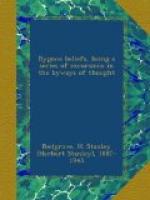RALPH CUDWORTH was born at Aller, in Somersetshire, in 1617. He entered Emmanuel College in 1632, three years afterwards gained his B.A., and became M.A. in 1639. In the latter year he was elected a fellow of his college. Later he obtained the B.D. degree. In 1645 he was appointed Master of Clare Hall, in place of the ejected Dr PASHE, and was elected Regius Professor of Hebrew. On 31st March 1647 he preached a sermon of remarkable eloquence and power before the House of Commons, which admirably expresses the attitude of his school as concerns the nature of true religion. I shall refer to it again later. In 1650 CUDWORTH was presented with the college living of North Cadbury, which WHICHCOTE had resigned, and was made D.D. in the following year. In 1654 he was elected Master of Christ’s College, with an improvement in his financial position, there having been some difficulty in obtaining his stipend at Clare Hall. In this year he married. In 1662 Bishop SHELDON presented him with the rectory of Ashwell, in Hertfordshire. He died in 1688. He was a pious man of fine intellect; but his character was marred by a certain suspiciousness which caused him wrongfully to accuse MORE, in 1665, of attempting to forestall him in writing a work on ethics, which should demonstrate that the principles of Christian morality are not based on any arbitrary decrees of God, but are inherent in the nature and reason of things. CUDWORTH’S great work—or, at least, the first part, which alone was completed,—The Intellectual System of the World, appeared in 1678. In it CUDWORTH deals with atheism on the ground of reason, demonstrating its irrationality. The book is remarkable for the fairness and fulness with which CUDWORTH states the arguments in favour of atheism.
So much for the lives and individual characteristics of the Cambridge Platonists: what were the great principles that animated both their lives and their philosophy? These, I think, were two: first, the essential unity of religion and morality; second, the essential unity of revelation and reason.
With clearer perception of ethical truth than either Puritan or High Churchman, the Cambridge Platonists saw that true Christianity is neither a matter of mere belief, nor consists in the mere performance of good works; but is rather a matter of character. To them Christianity connoted regeneration. “Religion,” says WHICHCOTE, “is the Frame and TEMPER of our Minds, and the RULE of our Lives”; and again, “Heaven is FIRST a Temper, and THEN a Place."[1] To the man of heavenly temper, they taught, the performance of good works would be no irksome matter imposed merely by a sense of duty, but would be done spontaneously as a delight. To drudge in religion may very well be necessary as an initial stage, but it is not its perfection.
[1] My quotations from WHICHCOTE and SMITH are taken from the selection of their discourses edited by E. T. CAMPAGNAC, M.A. (1901).




